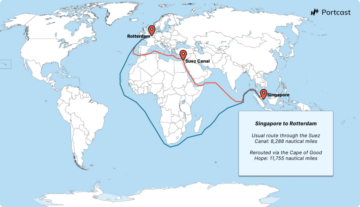
Mercedes-Benz incorporates ChatGPT in Supply Chain
Mercedes-Benz plans to integrate OpenAI’s ChatGPT technology into its manufacturing processes and vehicles. In its factories, ChatGPT’s voice-based interface will enable employees without programming backgrounds to use data analysis tools and evaluate process production data stored in Mercedes-Benz’s digital ecosystem. The technology aims to help employees make faster strategic decisions regarding the production process by presenting data queries in a dialogue format with the chatbot, simplifying information access and daily production planning adjustments.
Moreover, the automaker has already partnered with Microsoft to integrate ChatGPT into voice control in its vehicles. The feature was rolled out to 900,000 vehicles in the U.S. with the MBUX entertainment system. Similarly, General Motors (GM) is also exploring the application of ChatGPT as a voice assistant in cars, providing customers with easier access to information typically found in user manuals.
By leveraging ChatGPT in both manufacturing and vehicles, automakers like Mercedes-Benz and GM aim to enhance productivity, optimize production processes, and improve the overall user experience for their customers. The technology’s integration is expected to bring greater efficiency and convenience, impacting both the production line and driver interactions with the vehicle.
Interested? Click here to read more
US partners with Panama to Boost Semiconductor Supply
The U.S. State Department will collaborate with the Government of Panama to explore opportunities for growing and diversifying the global semiconductor ecosystem through the International Technology Security and Innovation Fund (ITSI Fund), established by the CHIPS Act of 2022. This partnership aims to create a more resilient, secure, and sustainable global semiconductor value chain and foster increased collaboration between the United States and Panama in the semiconductor industry.
The focus of the partnership will be on conducting a review of Panama’s existing semiconductor ecosystem, regulatory framework, and workforce and infrastructure needs. The findings will guide potential future cooperation to develop this critical sector and ensure that both countries benefit from cutting-edge technology.
The CHIPS Act of 2022, signed by President Biden in August 2022, allocated new funding to enhance domestic manufacturing and research of semiconductors in the United States. The ITSI Fund, established under the CHIPS Act, provides the U.S. Department of State with $500 million over five years to expand global semiconductor manufacturing, secure supply chains, and develop secure Information and Communications Technology networks and services through partnerships with allies and partners.
The collaboration between the U.S. and Panama is expected to foster greater growth and innovation in the semiconductor industry, and enhance the supply chain’s resilience and diversity. It will also strengthen technological capabilities and workforce development in both countries.
Read more here
Kraft Heinz to build $400M automated DC in Illinois
Kraft Heinz plans to construct a fully automated distribution center (DC), equipped with advanced technology and robotics. The facility will feature a warehouse control system and a 29-crane automated storage and retrieval system, enabling 24/7 operation and fully automated selection of products. The move aligns with other industry players adopting automation to enhance supply chain efficiency.
The demand for warehouse automation has risen due to increased e-commerce during the pandemic, driving the need for more warehousing space across industries. General Mills and Associated Foods have already implemented warehouse automation, while Sam’s Club is expanding its use of automated fulfilment and distribution centers. Kraft Heinz’s focus on technology investment aligns with its CEO’s strategy to address supply chain challenges effectively. The company applied artificial intelligence to supply chain visibility, leading to a $30 million sales boost.
Moreover, a shift to Microsoft’s Azure cloud computing service aimed to create a more resilient supply chain. This decision will likely improve Kraft Heinz’s supply chain efficiency, reducing costs and enhancing performance. The automation trend signifies the industry’s recognition of advanced technology’s potential to meet evolving market demands.
Click here to read more
- SEO Powered Content & PR Distribution. Get Amplified Today.
- PlatoData.Network Vertical Generative Ai. Empower Yourself. Access Here.
- PlatoAiStream. Web3 Intelligence. Knowledge Amplified. Access Here.
- PlatoESG. Automotive / EVs, Carbon, CleanTech, Energy, Environment, Solar, Waste Management. Access Here.
- BlockOffsets. Modernizing Environmental Offset Ownership. Access Here.
- Source: https://www.allthingssupplychain.com/supply-chain-weekly-wrap-up-07-14-2023-07-20-2023/?utm_source=rss&utm_medium=rss&utm_campaign=supply-chain-weekly-wrap-up-07-14-2023-07-20-2023
- :has
- :is
- 000
- 2022
- a
- access
- across
- Act
- address
- adjustments
- Adopting
- advanced
- Advanced Technology
- aim
- aimed
- aims
- Aligns
- allocated
- already
- also
- analysis
- and
- and infrastructure
- Application
- applied
- artificial
- artificial intelligence
- AS
- Assistant
- associated
- AUGUST
- automakers
- Automated
- Automation
- backgrounds
- BE
- benefit
- between
- biden
- boost
- both
- bring
- build
- by
- capabilities
- cars
- Center
- Centers
- chain
- chains
- challenges
- chatbot
- ChatGPT
- Chips
- CHIPS Act
- click
- Cloud
- cloud computing
- club
- collaborate
- collaboration
- Communications
- company
- computing
- conducting
- construct
- control
- convenience
- cooperation
- Costs
- countries
- create
- critical
- Customers
- cutting-edge
- cutting-edge technology
- daily
- data
- data analysis
- dc
- decision
- decisions
- Demand
- demands
- Department
- develop
- Development
- dialogue
- digital
- digital ecosystem
- distribution
- Diversity
- Domestic
- driver
- driving
- due
- during
- e-commerce
- easier
- ecosystem
- effectively
- efficiency
- employees
- enable
- enabling
- enhance
- enhancing
- ensure
- Entertainment
- equipped
- established
- evaluate
- evolving
- existing
- Expand
- expanding
- expected
- experience
- explore
- Exploring
- Facility
- factories
- faster
- Feature
- findings
- five
- Focus
- foods
- For
- format
- Foster
- found
- Framework
- from
- fully
- fund
- funding
- future
- General
- General Mills
- General Motors
- Global
- GM
- Government
- greater
- Growing
- Growth
- guide
- Have
- help
- HTTPS
- impacting
- implemented
- improve
- in
- incorporates
- increased
- industries
- industry
- industry’s
- information
- information and communications
- Infrastructure
- Innovation
- integrate
- integration
- Intelligence
- interactions
- Interface
- International
- into
- investment
- IT
- ITS
- jpg
- leading
- leveraging
- like
- likely
- Line
- make
- manufacturing
- Market
- Meet
- Microsoft
- million
- more
- Motors
- move
- Need
- needs
- networks
- networks and services
- New
- New Funding
- of
- on
- operation
- opportunities
- Optimize
- Other
- out
- over
- overall
- Panama
- pandemic
- partnered
- partners
- Partnership
- partnerships
- performance
- planning
- plans
- plato
- Plato Data Intelligence
- PlatoData
- players
- potential
- president
- president biden
- process
- processes
- Production
- productivity
- Products
- Programming
- provides
- providing
- queries
- Read
- recognition
- reducing
- regarding
- regulatory
- research
- resilience
- resilient
- review
- Risen
- robotics
- Rolled
- s
- sales
- sector
- secure
- secure supply
- security
- selection
- semiconductor
- Semiconductors
- service
- Services
- shift
- signed
- signifies
- Similarly
- simplifying
- Space
- State
- State Department
- States
- storage
- stored
- Strategic
- Strategy
- Strengthen
- supply
- supply chain
- Supply Chain Challenges
- Supply Chain Visibility
- Supply chains
- sustainable
- system
- technological
- Technology
- that
- The
- their
- this
- Through
- to
- tools
- Trend
- typically
- u.s.
- under
- United
- United States
- use
- User
- User Experience
- value
- vehicle
- Vehicles
- visibility
- Voice
- Voice Assistant
- Warehouse
- Warehouse Automation
- Warehousing
- was
- weekly
- while
- will
- with
- without
- Workforce
- Workforce Development
- years
- zephyrnet












